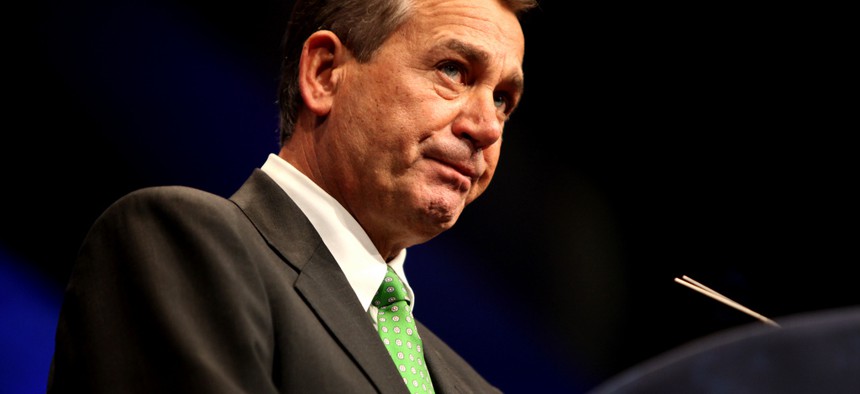
Flickr user gageskidmore
Analysis: Republicans Are Unlikely to Win a Budget Showdown
GOP's best bet is to work toward a realistic fiscal deal with Democrats.
It's difficult to understand why any Republicans on Capitol Hill would like their odds in any kind of budget showdown this fall that could result in a government shutdown. Very simply, they would be going into a game with an incredibly weak hand, and their odds of winning would be quite small.
Think of it this way: Yes, the public holds Democrats on Capitol Hill in, as they say, minimum high regard. A July CBS News national poll showed that just 36 percent of Americans approved "of the way the Democrats on Capitol Hill are handling their job," while 55 percent disapproved, for a net of minus 19 points. A Gallup poll in June put the job-rating approval for Democrats on Capitol Hill at just 34 percent, with disapproval at 61 percent, a net of minus 27 points. The folks at Pew Research asked the same question in May, and the numbers for Democrats were 32 percent approval and 59 percent disapproval, a net of minus 27 points. So the net approval rating for Democrats on Capitol Hill ranges from minus 19 to minus 27 points.
As pathetic as those numbers seem, take a look at the responses to the same question asked about Republicans in Congress. The CBS poll that showed the Democrats approve/disapprove numbers at 36-55, a net of minus 19 points, put Republicans at 25 percent approve, 67 percent disapprove, a net of minus 42 points! Compared with the Democrats' numbers of 34-61 in the Gallup poll, a net of minus 27 points, the Republican numbers were 26-69, a net of minus 43 points. The Pew Poll shows Republicans at 22-68, a net of minus 46 points, in contrast to 32-59, a net minus of 27 points, for Democrats.
At this point my conservative readers are likely grinding their teeth and muttering about the "lamestream media" poll bias. But I would direct them to the Fox News polling, which gave Democrats on Capitol Hill a 32 percent approve/60 percent disapprove rating (a net minus of 28 points), while Republicans received a dismal 24 percent approve/66 percent disapprove (a net minus of 42 points). The truth is that on the standard-worded questions, approve-disapprove, ballot test-trial heats, and the like, Fox News polling varies very little from that of the polling by the three broadcast news networks, CNN, or the independents such as Gallup and Pew. It's only on some other questions—rather curiously worded ones, shall we say—that a thumb goes on the scale on Fox polling. (What you ask is what you get, no matter who sponsors the poll.)
The truth is that the public has a poor opinion of Democrats, and a horrible impression of Republicans on Capitol Hill. Which side goes into a card game with a weaker hand—one with approvals of between 32 and 36 percent with disapprovals of between 55 and 61 percent, or the one with approvals of between 22 and 26 percent and disapprovals that range from 66 to 69 percent?
Let's factor in the other player in this game, President Obama. Obama's job-approval ratings have been in a very gradual decline since February, losing roughly a point every three weeks. No, it's not Benghazi, the IRS, or domestic surveillance, it's just the slow leak that has become pretty standard for second-term presidents—call it "Lame-Duck Fatigue." In a second term, on most subjects and most days, the mute button has been hit for the president. But even that being the case, Obama's current Gallup job-approval rating is 46 percent, with a 51 percent disapproval (a net of minus 5 points). Fox News polling from early this month puts Obama's approval rating at 42 percent with a disapproval of 52 percent (net of minus 10 points). The July Pew Research poll put Obama's approval and disapproval ratings at 46 percent, while CBS put him a little better with 48 approve/45 percent disapprove (a net positive of 3 points).
While Obama's numbers are hardly impressive, they are still much better than those for congressional Democrats, and they aren't even in the same time zone as the bleak numbers for Republicans in Congress. This being the case, who goes into this fight with the least credibility? The answer is Republicans in Congress.
Logic would then indicate that Republicans acknowledge, at least to themselves, the weakness of the hand they are playing, and hope to get the best deal they can, knowing that they can't completely win a showdown. At the same time, the question for Democrats is how much anxiety do they want to cause the public, and particularly those who have their retirement funds invested in the markets. Do they want to demand such enormous concessions from Republicans that Speaker John Boehner and Senate Minority Leader Mitch McConnell can't get their side to a deal at all, keeping in mind that the latter has a tea-party challenger in his Kentucky GOP primary next year?
It's a time for Republicans to be realistic and for both sides to be adults—and allow a reasonable deal to be reached.
(Image via Flickr user gageskidmore)






